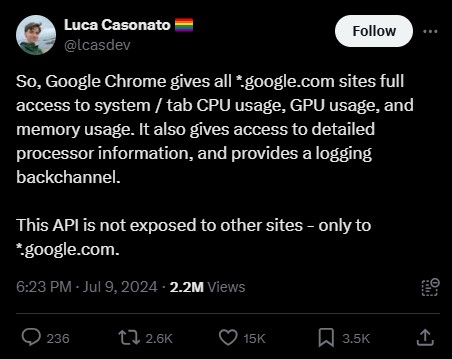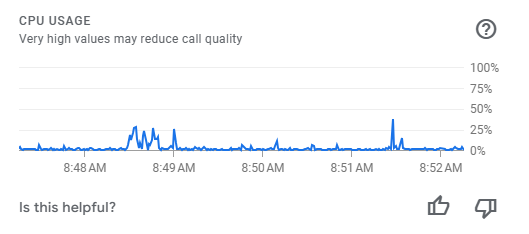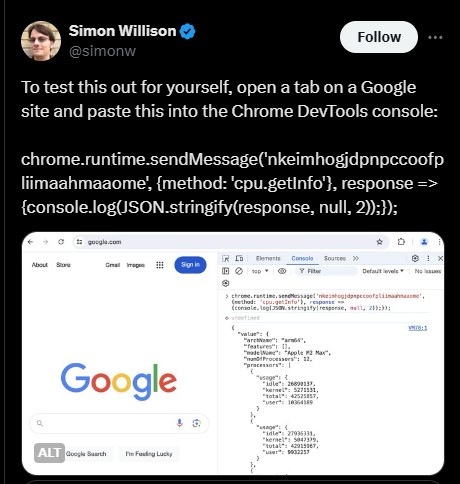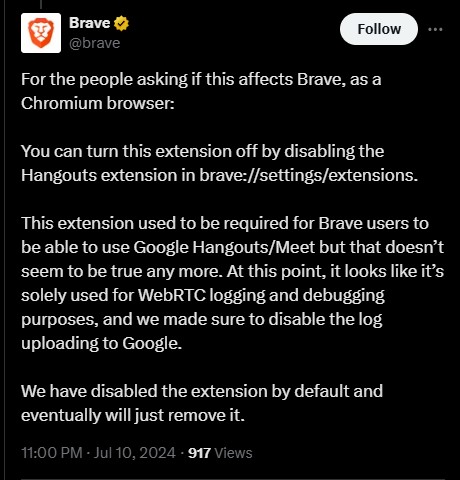Update 15/07/24: Speaking to The Register, a Google spokesperson recently denied any wrongdoing, stating that:
Today, we primarily use this extension for two things: To improve the user experience by optimizing configurations for video and audio performance based on system capabilities [and] provide crash and performance issue reporting data to help Google services detect, debug, and mitigate user issues. Both are important for the user experience and in both cases we follow robust data handling practices designed to safeguard user privacy.
Original article follows:
A recent discovery by software developer Luca Casonato has ignited a debate over Google Chrome’s potential violation of the European Union’s Digital Markets Act (DMA). Casonato revealed that Chrome grants exclusive access to system-level CPU, GPU, and memory usage data, along with detailed processor information, to websites under the *.google.com domain. This access is not available to other websites, potentially violating the DMA, which aims to prevent anti-competitive behavior by major tech companies.
While the capability itself is seen as a positive development, particularly for Google Meet’s troubleshooting features that allow real-time monitoring of CPU usage and potential adjustments to stream quality, the exclusivity of this access to Google’s own services has raised eyebrows.

The core issue lies in the competitive disadvantage imposed on non-Google services. For instance, Zoom cannot offer the same CPU debugging features as Google Meet due to the lack of access to these detailed system metrics. Casonato emphasized that while the feature itself is beneficial for monitoring and adjusting stream quality in real-time during calls, its limited availability to Google sites is problematic. “The idea is good. The Google-only implementation is not,” he stated, underscoring the anti-competitive nature of this exclusivity.
Casonato argues that this practice creates an uneven playing field, putting competitors like Zoom at a disadvantage as they cannot offer similar features without requiring users to install extensions and grant permissions.

The DMA, designed to curb anti-competitive practices by major tech companies, stipulates that gatekeepers of the internet must provide equal access to capabilities to all players. Casonato’s findings have led to speculation that Google’s exclusive data access may be in violation of this principle.
Interestingly, the mechanism for this exclusive access is a built-in Chrome extension that is not visible in the extensions panel and cannot be disabled. Simon Willison, another developer, provided a snippet of code that users can run in the Chrome DevTools console to verify this claim.

Chiming in the conversation, GrapheneOS developer revealed that this extension is not enabled by default in all Chromium builds, but it requires a specific build configuration. This means that Brave and Edge have consciously chosen to enable this capability. In response to these claims, Brave clarified that the extension can be turned off by disabling the Hangouts extension in brave://settings/extensions. They noted that while this extension was previously required for Brave users to utilize Google Hangouts/Meet, it is no longer necessary. Currently, it is used solely for WebRTC logging and debugging purposes, and the Brave team has ensured that log uploading to Google is disabled. The extension is disabled by default in Brave, and they plan to remove it eventually.

The European Commission has already opened investigations into Google under the DMA for potential antitrust violations. While this feature gives Google services an advantage, it is likely to attract more regulatory attention. Given the EU’s ongoing investigations, this feature may soon be removed or modified to comply with the regulations.
The revelations about Chrome’s preferential access to system resources raise significant questions about fairness and competition in the browser market. Non-Google services like Zoom are at a clear disadvantage, unable to offer similar features without imposing additional hurdles on users.
For users concerned about privacy and fair competition, alternative browsers like Firefox or Ungoogled Chromium, which remove Google web service dependencies, might be preferable choices.
TechIssuesToday primarily focuses on publishing 'breaking' or 'exclusive' tech news. This means, we are usually the first news website on the whole Internet to highlight the topics we cover daily. So far, our stories have been picked up by many mainstream technology publications like The Verge, Macrumors, Forbes, etc. To know more, head here.

![[Updated] Google Chrome's exclusive access to system data sparks EU antitrust concerns [Updated] Google Chrome's exclusive access to system data sparks EU antitrust concerns](https://techissuestoday.com/wp-content/uploads/2024/05/google-chrome-featured-image.webp)
